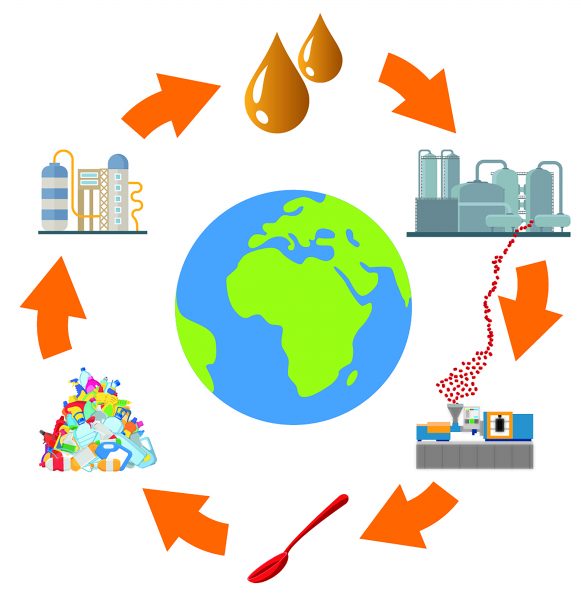When plastic becomes oil again: igus invests in chemical recycling pioneer

Renewable, sustainable and waste reducing: these are the goals behind the Catalytic Hydrothermal Reactor technology (short: Cat-HTR). It allows plastic waste to be recycled within 20 minutes. This means that the crude oil obtained can be used again for the production of new polymer products. In order to support the circular economy of plastics, igus has now invested 4.7 million euros in a company that wants to put the first commercial Cat-HTR plant into operation.
Every year, eight million tons of plastic are released into the oceans. At the same time, the value of these lost resources is 80 billion US dollars. The problem: so far, most of the plastics are incinerated and only 14 percent are recycled. Plastic recycling is therefore also an important topic at igus. In classic recycling – the shredding and reuse of plastics – igus has been taking a bold step with the new chainge program since October last year. The company takes back “e-chains”/energy chains after the end of a machine’s life, independently of the manufacturer, regranulates the plastic and processes it again. “With the igus chainge program, we have begun recycling plastics from old products. This is the best way for high-performance plastics,” says Frank Blase, Managing Director of igus GmbH.
Back to oil with water, high temperatures and pressure
Worldwide, mixed waste is always left over, with non-technical plastics in 100 to 1000 times larger quantities. “Chemical recycling’ offers new solutions here,” explains Blase. “In the middle of the year, I became aware of the Catalytic Hydrothermal Reactor technology in an article in the FAZ and contacted the German inventor Professor Thomas Maschmeyer in Sydney. Seven months later, after intensive research, igus is now investing four million British pounds (4.7 million euros) in Mura Technology Limited and thus also in the construction of the first Cat HTR plant. The patented Catalytic Hydrothermal Reactor was developed in 2007 and tested for over 10 years in a pilot plant in Australia. With Cat-HTR, classic non-recyclable plastic waste can be converted back into crude oil within 20 minutes, and this in a more resource-saving manner than the extraction of fossil crude oil. Only water, high temperatures and pressure are used to separate and recombine the cells. One plant alone can process 20,000 tons of plastic in one year, reducing 28,180 tons of CO2. This corresponds to the annual consumption of 5,983 cars or the annual energy requirements of 4,914 households.
Plastics recycling with Cat-HTR plant
The first commercial Cat HTR plant is currently being planned in Wilton, UK. Construction is scheduled to start this year. Waste management companies deliver the waste to meet their recycling targets. Subsequently, oil is recovered, which the customer can purchase at a price similar to fossil oil. A total of four catalytic hydrothermal reactors are to be built at Wilton to process over 80,000 tons of plastic waste annually. In the next step, Mura plans to issue licenses and build plants worldwide. “We are committed to bringing the world of plastics into balance with technical solutions,” says Frank Blase.
For more information, please visit: https://www.igus.com/
News Categories
- » NEWS HOME
- » Automation & Robotics
- » Industry 4.0
- » Material Handling
- » Sensors
- » Quality & Testing
- » Machine Vision
- » Laser & Optics
- » Metalworking
- » Motion Control & Drives
- » Hydraulics & Pneumatics
- » Process Industry
- » Renewable Energy
- » Agriculture
- » Home & Office Furniture
- » Environmental Tech



